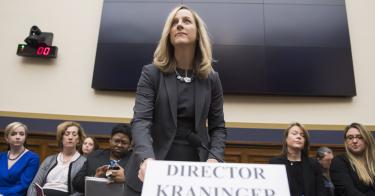On Tuesday, the Consumer Financial Protection Bureau officially rescinded the most harmful provisions of its 2017 payday lending rule. Good riddance.
Thankfully, Bureau Director Kathy Kraninger stood up to the onslaught from so-called consumer activists trying to keep the old rule in place. In the official announcement, Kraninger (correctly) notes that:
A vibrant and well-functioning financial marketplace is important for consumers to access the financial products they need and ensure they are protected. Our actions today ensure that consumers have access to credit from a competitive marketplace, have the best information to make informed financial decisions, and retain key protections without hindering that access.
Detractors of the rule frequently talk about the importance of maintaining access to credit, but their goal is really to provide access to credit only on terms that they think are appropriate. The associate director of the National Consumer Law Center, for instance, wants a national rate cap, despite the fact that price controls end disastrously every time they are implemented.
The best way to provide broad-based access to credit is to foster a competitive environment where lenders and borrowers can agree on the best terms for their circumstances.
The old rule was driven by over-zealous paternalism and politics, not by evidence or anything resembling an interest in well-functioning financial markets. It threatened to starve millions of hard working Americans out of short-term credit markets, openly acknowledging its provisions might reduce lending in the industry by as much as 84 percent.
With such open hostility to an industry, one would think there must be hordes of angry customers and piles of evidence demonstrating grave harm done.
The truth, though, is that the activists failed to muster convincing evidence supporting their claim that small-dollar loan companies—even payday advance companies—were systemically trapping people in debt. To the contrary, the evidence showed that these companies were regularly helping people get access to the credit they needed, and that customers typically understood exactly what they were getting into.
Typically, customers knowingly chose to roll over their payday loan before becoming debt free, and could accurately predict when they would be debt free for one pay period. One researcher who spent four months working for RiteCheck reported that many payday customers valued the lending service so much that they even tipped their tellers.
But none of this has ever mattered to the advocates of the restrictive 2017 rule, a group that still oozes open hostility to private businesses.
One of them, Sen. Elizabeth Warren, D-Mass., called the decision to rescind the rule’s underwriting provisions “appalling,” and former Bureau Director Richard Cordray, who was responsible for the original rule, said that “Protecting consumers again takes a back seat to catering to the financial industry.”
But Warren and Cordray fail to acknowledge several key facts.
For starters, federal and state consumer protection laws have protected payday customers from unfair and deceptive practices since long before the Bureau existed. The notion that a lender could outright trick a borrower and get away with it is just false.
Separately, private businesses thrive by satisfying their customers, not by regularly abusing them. It is ludicrous to suggest that rescinding a rule that would have effectively ended a common business practice is “catering” to an industry.
Thankfully, the Bureau now seems to understand that private exchanges are mutually beneficial, and that people can be trusted to figure out what works best for their own situations. The final rule officially “withdraws the [2017] Rule’s determination that consumers do not understand the materials risks, costs, or conditions of covered loans, as well as its determination that consumers do not have the ability to protect their interests in selecting or using covered loans.”
My colleagues and I have not exactly been fans of the CFPB, but the Bureau was right to rescind these provisions in the 2017 payday rule. This new final rule is a great step toward helping “to ensure the continued availability of small dollar lending products for consumers who demand them, including those who may have a particular need for such products as a result of the current pandemic.”
Incidentally, in May, the Bureau also released No-Action Letter (NAL) Templates, one of which is designed so that “insured depository institutions can…apply for a NAL covering their small-dollar credit products.” For the last few decades, other federal regulators (and compliance costs) have pushed banks out of the small dollar lending space, so this NAL should, at the very least, provide some regulatory certainty to banks who want to make these loans.
The CFPB’s 2017 payday lending rule was unnecessary and harmful. This final rule is a huge improvement. Kraninger deserves credit for sticking to her guns and trying to broaden access to credit by fostering competition.
This piece originally appeared in Forbes https://www.forbes.com/sites/norbertmichel/2020/07/08/consumers-win-as-consumer-financial-protection-bureau-finalizes-payday-loan-rule/#44f540f24903



